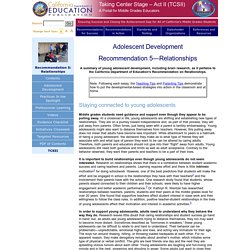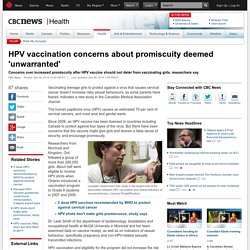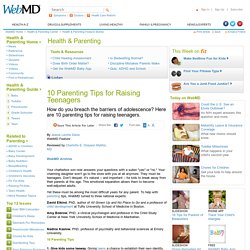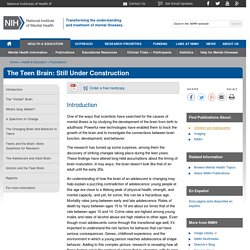

Adolescent Development: Relationships. A summary of young adolescent development, including brain research, as it pertains to the California Department of Education's Recommendation on Relationships.

Staying connected to young adolescents Middle grades students need guidance and support even though they appear to be pulling away. At a crossroad in life, young adolescents are shifting and establishing new types of relationships. They are on a journey toward independence and, as part of that process, they will pull away from parents. Often times, just being seen with a parent is terribly embarrassing. Understanding adolescent behavior in building better relationships The early adolescent male Young adolescent boys’ main growth hormone is testosterone. The early adolescent female Girls, too, have receptor stations for their predominant hormone estrogen. Interacting with young adolescents Caring taps into the emotion centers in the brain that cause the brain to pay attention. Understanding peer relationships Teaching tips:
Child Development & Early Childhood Development. Create Balance to Raise Well-Rounded Gifted Teens. Raising a balanced teenager is a monumental task for parents, but when it comes to raising a gifted child, striking a balance can become a bit too tricky.

The entire energy of a gifted child is centered around the activity he/she is most passionate about. For example, a gifted teen, who is passionate about music, may prefer to play a musical instrument to the extent of excluding every other activity from his/her life. This calls for parental intervention to encourage the child to participate in other activities, so that a balance is created in their lives. However, this task is not easy to achieve. Seek a balance in passion For a gifted teen, there may be just one activity that he/she is most passionate about, but as a group they are diverse with exceptional talents.
Choose the right school Certainly, schools play a major role in creating this balance in a gifted child’s life. Well-rounded does not mean perfectionism. Developing Adolescents. Early Exposure Toxic Substances Brain Architecture. Encyclopedia of Children's Health: Infancy through Adolescence. HPV Vaccination and Promiscuity. Vaccinating teenage girls to protect against a virus that causes cervical cancer doesn’t increase risky sexual behaviours, as some parents have feared, indicates a new study in the Canadian Medical Association Journal.

The human papilloma virus (HPV) causes an estimated 70 per cent of cervical cancers, and most anal and genital warts. Since 2006, an HPV vaccine has been licensed in countries including Canada to protect against four types of the virus. But there have been concerns that the vaccine might give girls and women a false sense of security, and encourage promiscuity. Canadian researchers their study is the largest look at the association between HPV vaccination and clinical indicators of sexual behaviour. (Jessica Rinaldi/Reuters) Researchers from Montreal and Kingston, Ont. followed a group of more than 260,000 girls.
Dr. HPV vaccination and eligibility for the program did not increase the risk of pregnancy or the STIs among females aged 14 to 17, the researchers found. How Music Can Change Your Brain. Parenting Teenagers: Discipline, Communication, and More. How do you breach the barriers of adolescence?

Here are 10 parenting tips for raising teenagers. Why do I need to register or sign in for WebMD to save? We will provide you with a dropdown of all your saved articles when you are registered and signed in. WebMD Archive Your chatterbox son now answers your questions with a sullen "yes" or "no. " Yet these must be among the most difficult years for any parent.
Teens and Peer Pressure So, just what high-risk behaviors might your adolescent feel pressured to engage in? Here are some of the survey's findings. To read more, click here © 2008 WebMD, LLC. David Elkind, PhD, author of All Grown Up and No Place to Go and a professor of child development at Tufts University School of Medicine in Boston.
Amy Bobrow, PhD, a clinical psychologist and professor in the Child Study Center at New York University School of Medicine in Manhattan. Continue reading below... Nadine Kaslow, PhD, professor of psychiatry and behavioral sciences at Emory University. 1. 2. The Teen Brain: It's Just Not Grown Up Yet. The Teen Brain: Still Under Construction. Introduction One of the ways that scientists have searched for the causes of mental illness is by studying the development of the brain from birth to adulthood.

Powerful new technologies have enabled them to track the growth of the brain and to investigate the connections between brain function, development, and behavior. The research has turned up some surprises, among them the discovery of striking changes taking place during the teen years. These findings have altered long-held assumptions about the timing of brain maturation.
In key ways, the brain doesn’t look like that of an adult until the early 20s. An understanding of how the brain of an adolescent is changing may help explain a puzzling contradiction of adolescence: young people at this age are close to a lifelong peak of physical health, strength, and mental capacity, and yet, for some, this can be a hazardous age. The "Visible" Brain The scans also suggest that different parts of the cortex mature at different rates. Reprints.